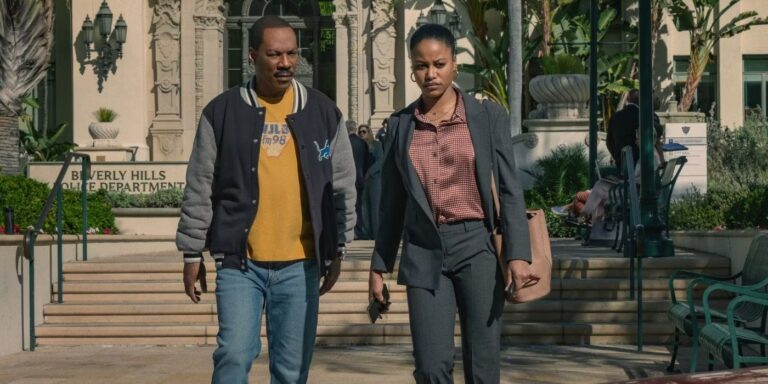Legacy sequels have become a staple of modern Hollywood fare, with studio executives seemingly hellbent on dragging every semi-recognizable IP out of mothballs and thrusting it back onto the big screen to wildly varying results, both in terms of box office success and critical acclaim. And while every once in awhile this experiment results in something truly remarkable — like 2020’s Top Gun Maverick, which grossed more than $1.4 billion worldwide — more often than not, these cinematic resurrections offer little more than a sprinkling of nostalgia, just enough to convince viewers to devote a few hours to an experience that’s likely to be mildly enjoyable and completely forgettable.
Such is the case with Beverly Hills Cop: Axel F, the fourth installment of a franchise that first began in 1984 and whose last entry arrived — to disastrous results — 30 years ago. There have been several attempts to revive, reboot and reimagine the series since that time: a fourth film was originally conceived in the mid-90s, shelved and revived about a decade later, then scrapped in favor of a television series centered around Murphy’s character and his son, which never made it past the pilot stage. Throw in another 10 years of development hell during which the project went through numerous screenwriters and directors, and we finally arrive in the present, with Murphy once again donning Axel Foley’s signature Detroit Lions jacket. Was it worth the wait?
The answer, regrettably, is a resounding “no.” Despite Murphy’s undeniable comedic charisma, Beverly Hills Cop: Axel F comes across as little more than a flimsy, half-hearted rehash of the original films, right down to repurposing some of the same needle drops; “The Heat is On” and “Neutron Dance” from the original film are both recycled here, along with Bob Seger’s “Shakedown,” which anchored the opening of Tony Scott’s second installment. Likewise, Axel’s trademark fondness for eschewing the police rulebook is on full display in the film’s opening scene, which finds our hero commandeering a snowplow and leaving a trail of destruction across the city as he pursues a gang of thieves that attempted to rip off the locker room of the Detroit Red Wings during a home game. It’s the best action sequence in the film, reminiscent of the cigarette truck heist that kicked off the original 1984 classic, but therein lies the problem: nearly every exciting or amusing moment in Axel F. feels like something we’ve seen before.
The incident which spurs Axel to return to the West Coast involves his estranged daughter, Jane (Taylour Paige), a Beverly Hills criminal defense attorney who hasn’t spoken to her father in years. Her newest client may have been framed for the murder of a cop, and someone doesn’t want Jane uncovering the truth, so when threats are made against her life Axel is on the next flight out, courtesy of a tip from his old pal Rosewood (Judge Reinhold), who traded in his badge for a P.I. license. Axel arrives to find Rosewood has gone missing and Jane, dismayed at her father’s audacity, wants absolutely no part of his attempt at reconciliation. To complicate matters, Axel finds himself butting heads with a young detective (Joseph Gordon Levitt) and a hotshot narcotics captain (Kevin Bacon), not to mention earning the ire of his old pal Taggart (John Ashton), now running the department as the Chief of Police.
Overcomplicated though its plot may be, Axel F still finds time to shoehorn in a few additional cameos, including Paul Reiser as Axel’s long-suffering partner-turned-captain, and Bronson Pinchot’s European art dealer Serge, now an expert on the local housing market. The appearance of the latter feels more than a little gratuitous, but it makes for one of the film’s funniest sequences as he introduces Axel and his entourage to a harried real estate agent (Nasim Pedrad) whose dead-behind-the-eyes smile looks like a TikTok filter that can’t be turned off.
Beverly Hills Cop: Axel F may be an improvement over its predecessor — not exactly a difficult task — but it pales in comparison to the original film and its more action-focused follow-up. Murphy can still turn on the charm when he wants to, but it often feels like he’s just going through the motions, and his performance is missing the energy and spark of recent fare like Dolemite is My Name (which remains one of his all-time best). Here, the jokes are less sharp, the action is less exciting, and the drama feels contrived, so unless you have a particular affinity for these characters — or you’re the sort of viewer who finds joy at recognizing a callback or reference — you’re better off skipping this trip to Beverly Hills.

